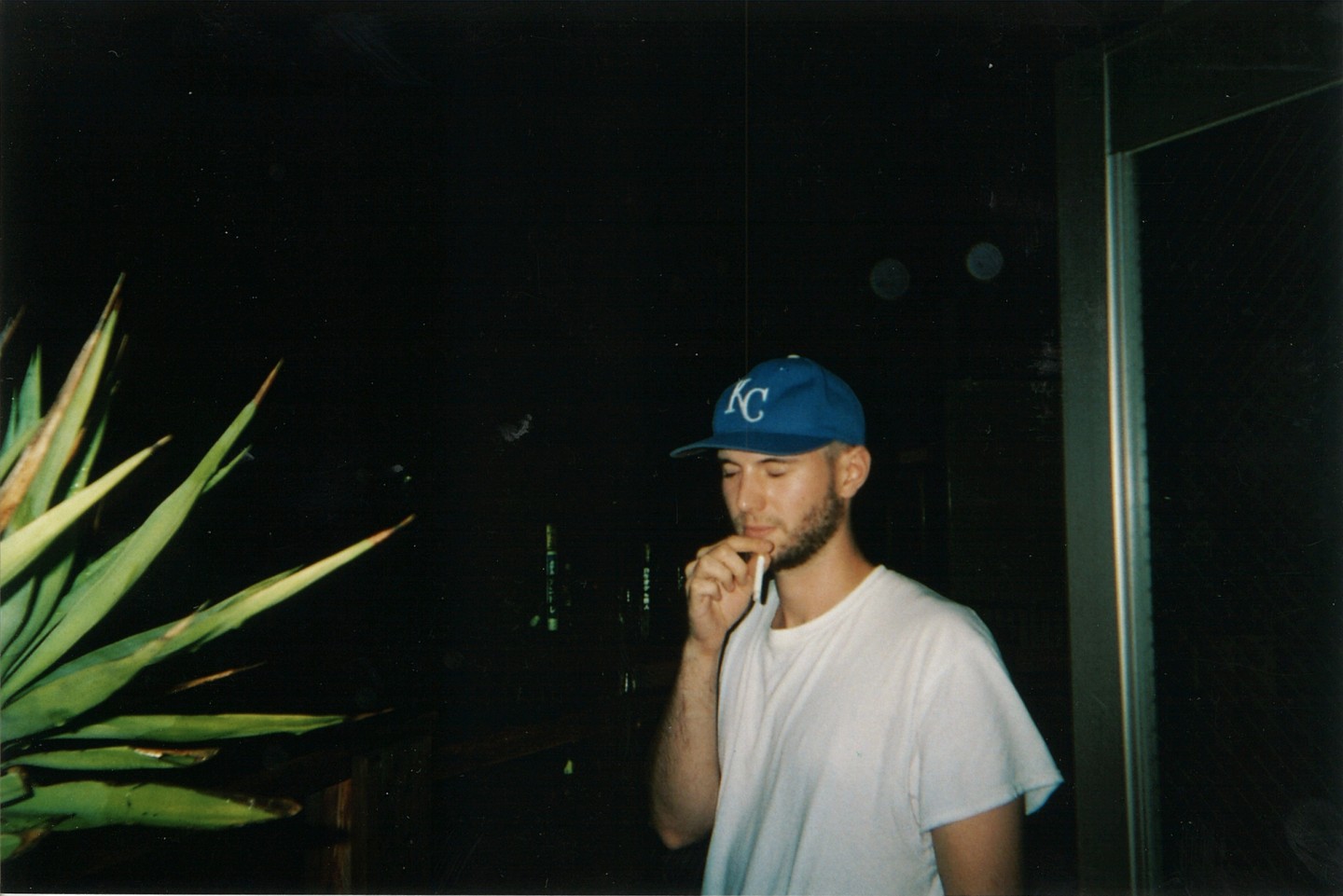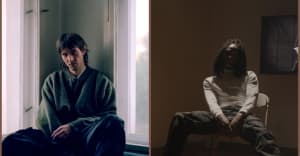How Nightlife Anxiety Inspired Huerco S. To Make The Perfect Ambient Album
The New York-based producer dreamed up his absorbing new record in the dead of night.
 Mathilde Chambon
Mathilde Chambon
Huerco S. likes making music best when he’s stoned. Over Skype, the producer (real name Brian Leeds) explains in his drawling Kansas accent that the hazy, relaxed mindset it creates helped him craft his forthcoming second full-length album, For Those Of You Who Have Never (And Also Those Who Have). Leeds has been releasing house, techno, and — more recently — ambient music as Huerco S. for five years now. Back in 2013, Oneohtrix Point Never’s Software label put out his debut album, Colonial Patterns, which edged away from 4/4 dancefloor territory, but bore a rough, industrial texture. The new album, however, feels like his most tranquil, melodic, and overtly emotional body of work to date.
Today has been fairly chilled for him so far — he’s had a long lie-in, walked out to a bodega to pick up some Honey Nut Cheerios, and fixed up a coffee before our afternoon chat. “It’s a beautiful day,” he beams, as we make introductions. His penchant for smoking weed is something that followers may have picked up on from his sporadically active Twitter, which is filled with dry humor, thoughtful observations, and recently, a picture of a test pressing of his new album with a joint placed neatly on the sleeve. With this record, he set out to capture the rush of unfiltered and, at times, totally nonsensical thoughts that occur when you’re either really high or really tired. After writing and recording throughout 2014 and 2015, the process of releasing the album was equally as casual, finding a home on his friend and oddball house DJ/producer Anthony Naples’s label Proibito.
Leeds may have been experimenting with ambient music both publicly and privately for more than half a decade now, but this is his first full-length excursion into the genre. For Those Of You... takes the abstract quality of his work and stretches it out even further to create dreamy, but at times uneasy meditations. There are woozy pads, shrill chime loops, and the occasional hint of churning percussion that sounds akin to a lethargic machine motor. The work of Wolfgang Voigt in his Gas guise, ‘90s German techno, IDM producers like Dettinger and Oval, and prolific Japanese ambient composer Hiroshi Yoshimura all served as inspiration. At times, the album’s tracks are especially reminiscent of the texture of a lot of ambient originating from Japan in the ‘80s like Yoshimura’s — light and hopeful, but with a distant air of melancholia. As we muse on his process, city life, and club anxiety, the sound of birds chirping placidly in the background filters through my laptop speakers.
The record contains tracks with names like “On The Embankment” and “Kraanvogel” [the Dutch word for a crane bird]. Were you surrounded by natural environments when you were making it?
HUERCO S.: I’m always influenced by nature. I made the album in my apartment in Brooklyn, which is the complete opposite of nature, but it’s me wanting to make these sounds for myself that gives me an escape into the nature, because there’s obviously not tons in New York. I live pretty far into Brooklyn, it’s a lot chiller out here — you’re not getting the hustle and bustle of Manhattan and Times Square areas, but it’s still a metropolitan area. If I wanted to, I could go to parks or go to upstate New York, but maybe I’m just lazy. I thought this was the easiest way to accomplish that: to create an escape myself.
Do you find that smoking weed brings you clarity while working on music?
Yeah, at least for me, you’re at ease and relaxed. You’re not as focused on the things surrounding you. It can feel like your mind is playing tricks on you sometimes, and that’s what I look for, these moments where you’re either stoned or tired or you don’t really know what’s going on. You’re like, Is this the music or am I hallucinating? There’s definitely moments when I’m working on music at 4 or 5 a.m. and I’m literally falling asleep while I’m making something. I don’t think that’s a bad thing at all.
Colonial Patterns had a thematic thread of America’s pre- and early colonial history. Was there an overt theme for this record?
With this one, it’s more about feelings and emotion. As the title suggests, it’s for those of you who have never and also those who have. It’s a dichotomy, everything can fit in that, you either have or you have not. Basically every song has been written about love. The album is a celebration of love, not just between you and a partner but with your friends and your family and celebrating life in general. It’s also about the opposite, the break-up — the darkness and the despair.
That was a very big thematic element to the album, and also relaxation, chill zen vibes. When I’m doing DJ gigs, I often find myself on a plane for seven or eight hours and I’m not the best for flying, so rather than popping a Xanax or drinking tons of red wine, I basically made the album for myself to listen to and fall asleep to.
 Mathilde Chambon
Mathilde Chambon
“That’s what I look for, these moments where you’re either stoned or tired or you don’t really know what’s going on. You’re like, ‘Is this the music or am I hallucinating?’”
How does the process of making an ambient album differ to making one that you would tailor for the dancefloor?
It’s really nice from a production standpoint to try new things. It’s not like I haven’t been making ambient music before, but here I’m totally devoting myself to that one style. Drums can often be a crutch, if you have some nice drum programming then it works in the club. It’s a lot harder to make something that someone can listen to in many settings. It’s one thing to make a song that sounds good at 4 a.m. when you’re drunk or high, and it’s another to make an album that sticks with someone at 6 a.m. on their way to work.
A lot of your previous music, like “Apheleia’s Theme” and your debut album Colonial Patterns, has been described as “lo-fi.” You were in punk and hardcore bands in your teens, has that approach informed your production style?
I don’t know if it was necessarily a conscious choice, I think it was out of necessity, even laziness. I record with two laptops. I have my old MacBook, which got shattered years ago, so the screen is fucked but the hard drive still works. Instead of getting what most good producers have — they have a soundcard and a nice mixer and USB and whatever the fuck — I would literally record this stuff from the computer onto [recording software] Audacity and mess with it.
Ambient music tends to have a very positive effect on people who suffer from anxiety, is that something that you’ve ever suffered from?
I don’t think I have a problem with anxiety like some people do, that it’s so bad that it’s crippling. Certain times, especially with social situations like going out and seeing my friends play, I can get anxious. The club and nightlife are full of anxiety for me.
As a DJ or performer, that’s something that’s not talked about a lot because you’re expected to have a good time. People forget that it’s your job; you’re coming to work. I was trying to explain it to people, if you have a day desk job, you don’t really hang at your job when you have the weekend off. That’s how I feel going out to clubs — it’s my work place. I’m pretty stone-faced and solemn when I DJ. Sometimes I’ll stand and close my eyes and play and I think about how boring that must look.
At clubs, it’s common now that you notice people looking at the DJ and expecting them to be doing something.
Some people who are involved in this scene now come at it from a live music standpoint — that’s how they were introduced to music, so all music events for them must be like a concert. And what do you at a concert? You stand there and you watch the person. Sometimes I prefer to play in a place where the DJ booth is really elevated or you’re hidden in a corner, that for me is amazing — when you’re apart from it.
